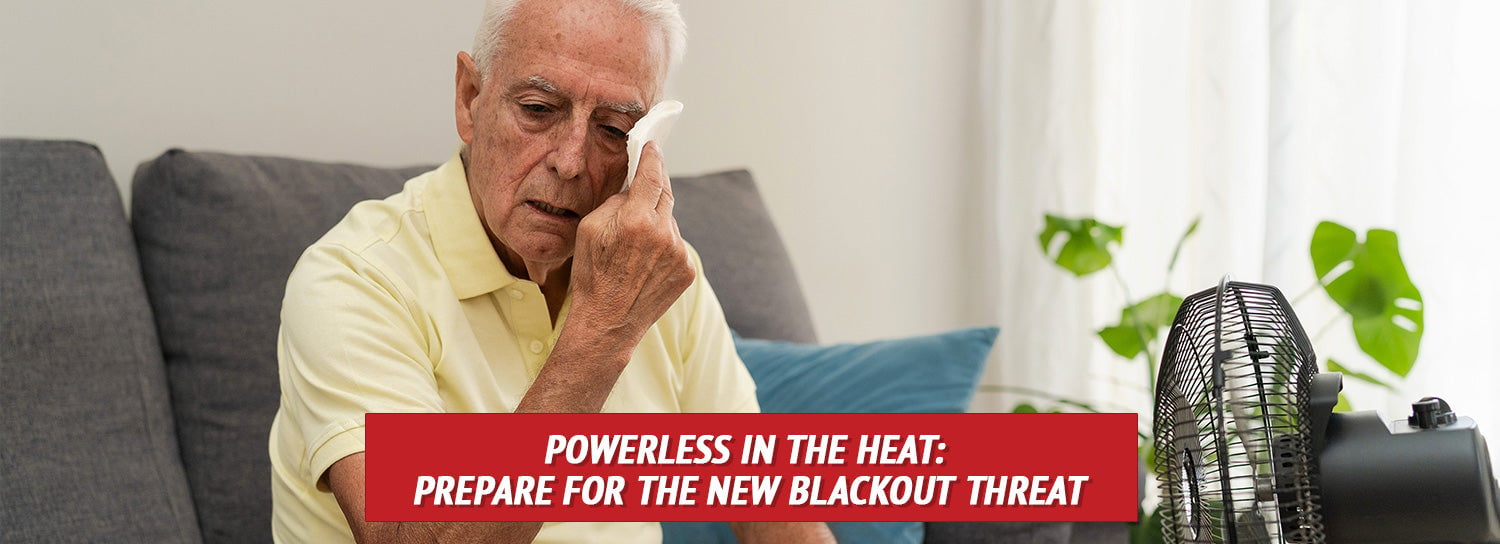
Summer blackouts aren’t just inconvenient – they’re dangerous.
And not everyone is equally prepared.
Heat waves, aging infrastructure, and growing demand from EVs and AC units are pushing the grid past its limits.
The result?
Rolling blackouts that hit hardest at night and devastate vulnerable populations.
When the power cuts out during extreme heat, it’s not just about spoiled food or uncomfortable nights.
It’s about medical equipment that stops working.
It’s about vulnerable loved ones left without cooling.
And it’s about a power grid that’s failing more often, for longer, during the hottest stretch of the year.
Read on to see the hard data behind rising summer outages, calculate your own “vulnerability index,” and get smart, practical ways to protect your home and family when the grid goes down.
The Danger of Summer Blackouts
We all know the dangers of winter weather, but extreme heat is just as deadly.
According to Weather Underground, “Extreme heat and extreme cold are both likely responsible for at least 1300 deaths per year in the U.S.”
Now, add in power outages during times of extreme heat, and you have an incredibly dangerous situation.
Especially for the elderly or those with preexisting health conditions.
In addition to heat stroke, there is also the issue of medical equipment not working.
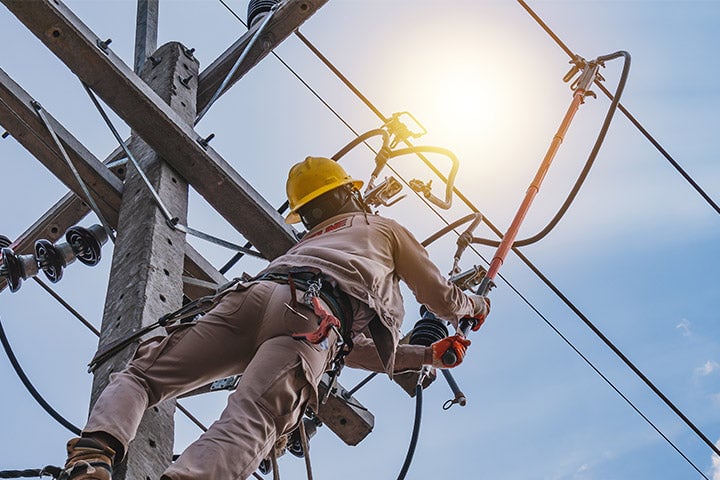
According to Scientific American, “The frequency of medically significant power outages, defined as those lasting eight hours or more, is higher in the summer, compared with winter. These outages peak during the late spring and midsummer and typically begin around 6 P.M., which coincides with the time of highest electricity usage.”
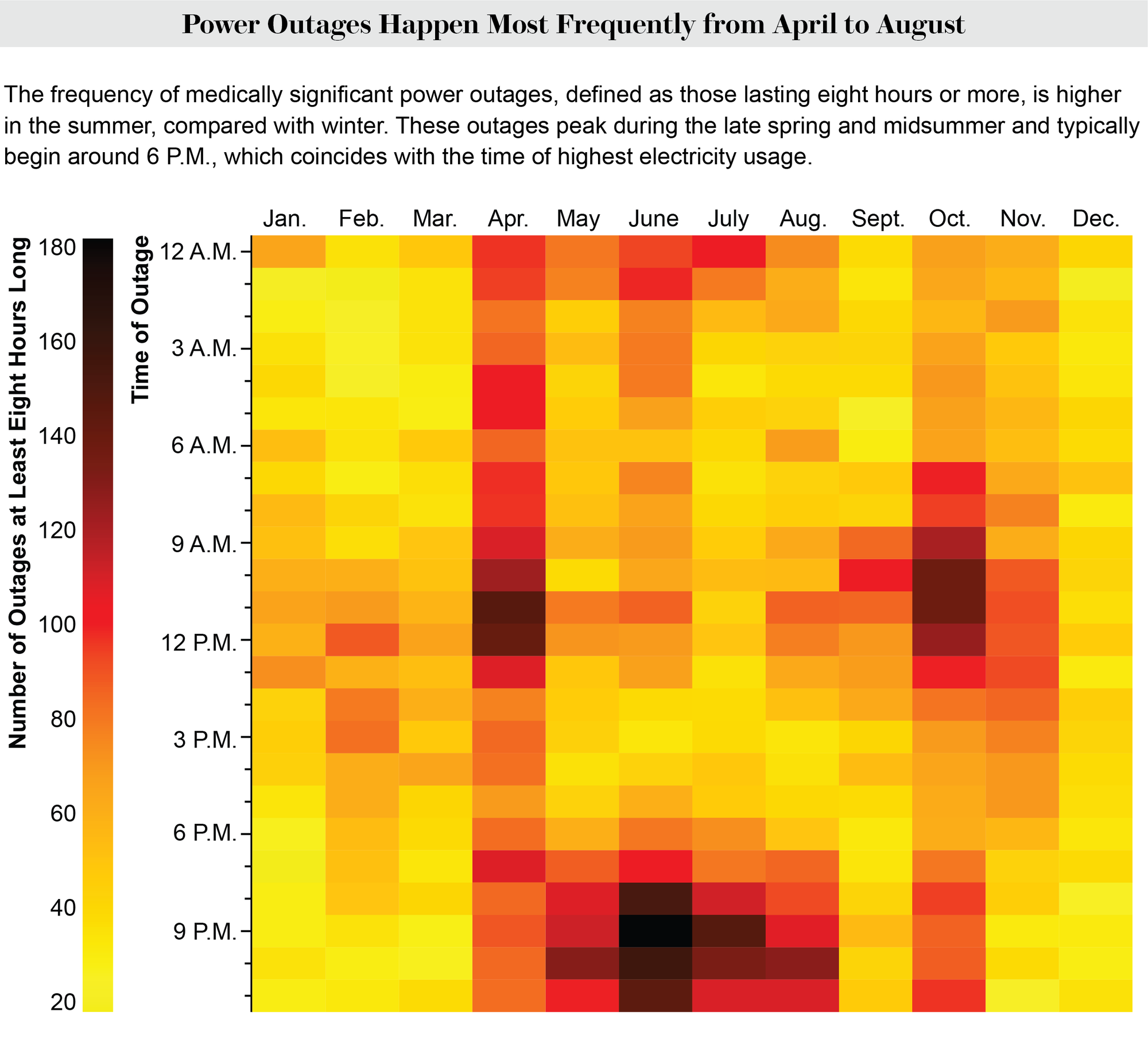
Credit: June Kim; Source: “Spatiotemporal Distribution of Power Outages with Climate Events and Social Vulnerability in the USA,” by Vivian Do et al., in Nature Communications, Vol. 14, Article No. 2470. Published online April 29, 2023
Medically significant power outages are those when the outage surpasses the standard battery lifespan for most medical equipment.
If you or one of your loved ones uses medical equipment that requires power, this is a serious concern.
Why America Is Experiencing More Summer Power Outages
Summer used to mean pool days and cookouts. Now, for many Americans, it means prepping for blackouts.
And no – it’s not just the weather’s fault.
Sure, extreme heat can strain the grid.
But the real problem runs deeper: We’re relying on an outdated, overburdened electrical system that can’t keep up with modern demand.
Our power grid is old.
Much of it was built decades ago, long before the explosion of home electronics, electric vehicles, and energy-sucking air conditioners.
It simply wasn’t designed to handle the load it’s now expected to carry during today’s record-breaking heat waves.
The older the grid gets without being updated, the weaker it is.
But the government would rather blame other things on the increasing power outages than pay to fix the real problem.
Glenn Beck explains, “It is estimated that our energy grid already today needs $7 trillion in upgrades. What are they doing? They're not upgrading the power grid; instead, they're trying to sell you electric cars, which will put more demands on the already antiquated power grid!”
[Read More: America’s Power Grid Is Built to Fail]
As a result, power companies and the government have started implementing rolling blackouts during the hottest months of the year to not put too much stress on the weak grid.
Do you live in one of the “lucky” states that have rolling blackouts during the hottest months of the year?
Or do you live in a vulnerable area?
Below are areas of the country that are much more vulnerable and susceptible to summer power outages due to their location, population, and economy.
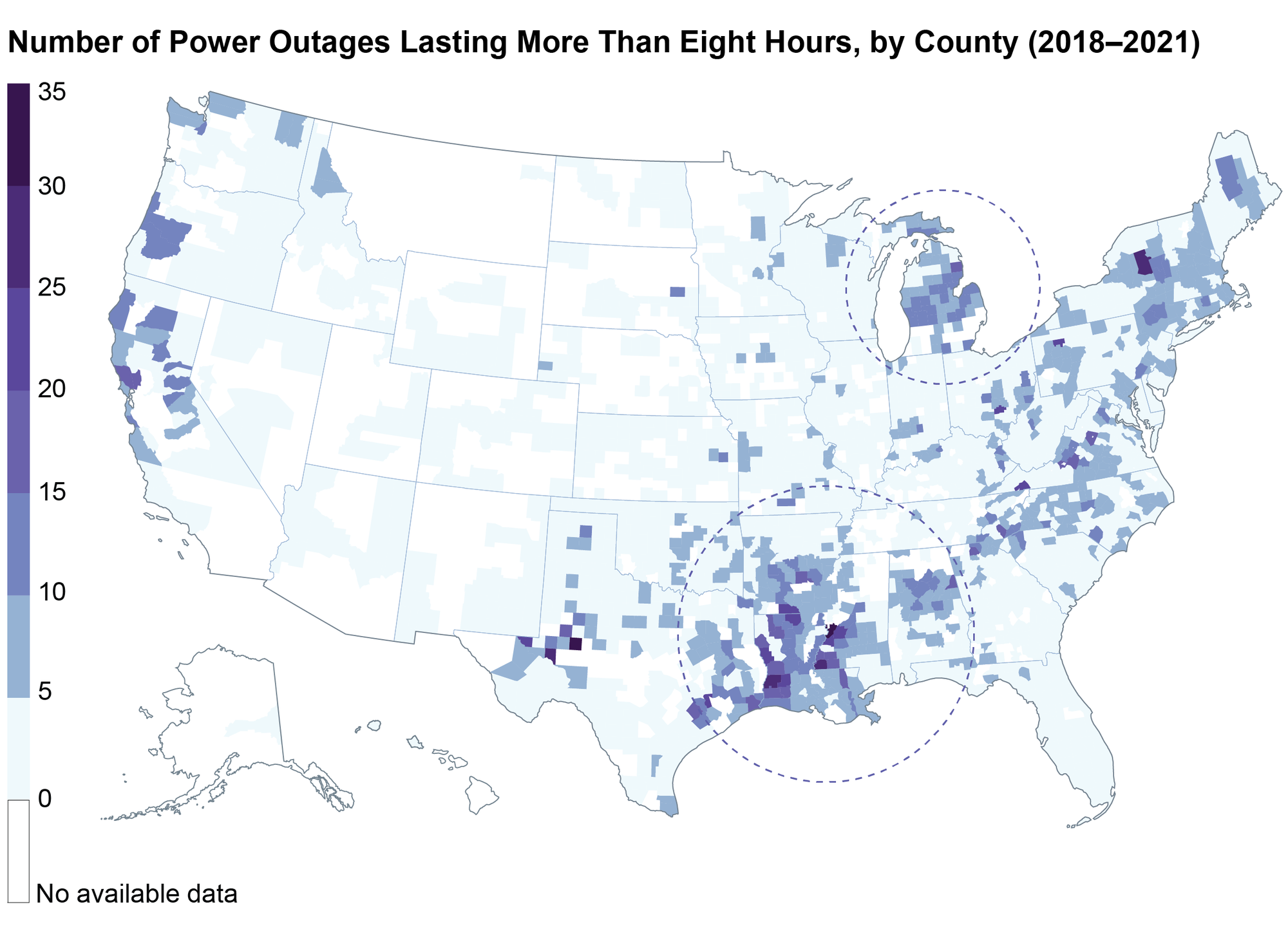
Credit: June Kim; Source: “Spatiotemporal Distribution of Power Outages with Climate Events and Social Vulnerability in the USA,” by Vivian Do et al., in Nature Communications, Vol. 14, Article No. 2470. Published online April 29, 2023
Proof That It Is Getting Worse instead of Better
Things are not getting better – they are getting worse.
Our government has all but ignored our power grid for far too long.
It’s no wonder we’re seeing a drastic increase in summer power outages…and that they are lasting significantly longer.
According to EIA data, “Between 2013 and 2021, the average duration of a power outage in the U.S. grew from approximately 3.5 hours to more than seven hours.”
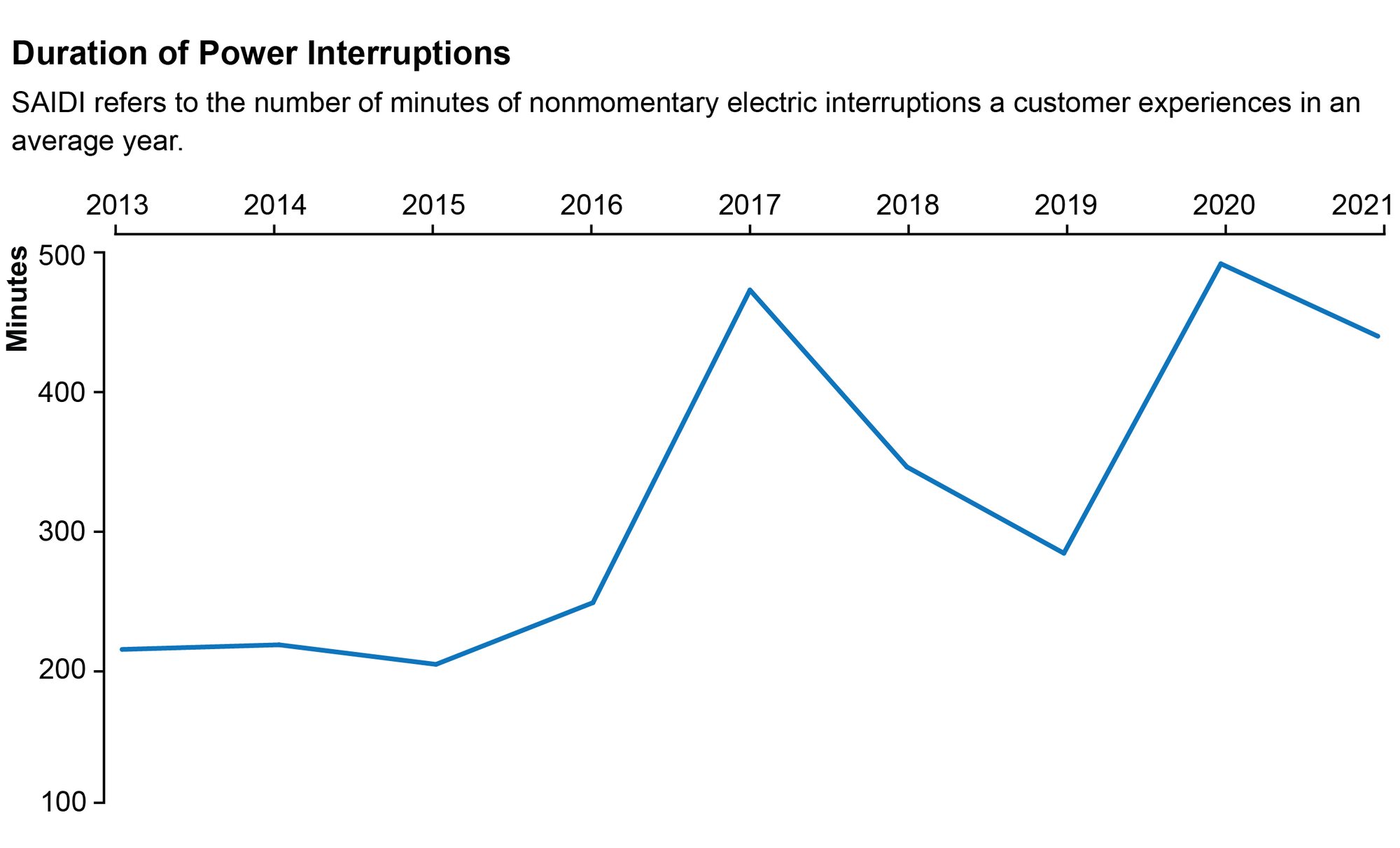
Credit: June Kim; Source: Reliability Metrics of U.S. Distribution System, U.S. Energy Information Agency
Here is some more proof from Climate Central:
- The US experienced about 60% more heat season power outages during the last 10 years (2014-2023) than during the first 10 years analyzed (2000-2009).
- Heat season outages accounted for nearly half (47% or 831) of all 1,755 weather-related outages during the 2000-2023 period.
- A recent study shows that widespread extreme heat has coincided with power outages in every US region from 2012 to 2021.
- The South faces more heat season power outages than any other region — followed closely by the Southeast, Northeast, and Ohio Valley.
- Texas and Michigan led all other states in total heat season outages.
- Studies suggest that major American cities are not prepared for more overlapping power outages and extreme heat.
- In Atlanta, Detroit, and Phoenix, between 68% and 100% of the population would face elevated risk of heat exhaustion or heat stroke during a combined blackout and heat wave. Such events could more than double rates of heat-related mortality in all three cities.
- A 2023 study found that long-duration (eight-hour or longer) outages were most prevalent across the Northeast, South, and Appalachia from 2018 to 2020.
Know Your Vulnerability Index
Some people can ride out a blackout with nothing more than a flashlight and a fan. Others? They’re at serious risk the moment the lights go out.
Your “vulnerability index” is a simple way to understand just how dangerous a summer outage could be for your household.
Ask yourself…
Where do you live?
If you’re in the South, Midwest, or a city with frequent blackouts, your risk is higher. Places like Texas, Michigan, and the Southeast lead the country in heat season outages.
What’s the weather like?
Do you regularly face triple-digit heat? Live in a poorly insulated home or top-floor apartment? These can trap heat fast during a blackout.
Who’s in your household?
Kids, the elderly, and anyone with heart or respiratory conditions are at much higher risk when the power goes out.
Do you rely on electricity for medical needs?
If someone in your home depends on a CPAP machine, oxygen, or refrigerated medication, a power cut can turn critical fast.
Can you stay cool without AC?
If you don’t have a generator or backup cooling source, even a few hours without power could be dangerous.
If you answered “yes” to two or more of these questions, your vulnerability index is high – and it’s time to take action.
How to Protect Your Home and Family
Since the grid isn’t getting fixed anytime soon, it’s up to you to protect your family during summer power outages.
Here are some tips to help you weather the heat during a power outage.
- Know Your Vulnerability Index. Be aware of your home’s vulnerability index. Do you live in an area where extreme weather and power outages are common? Is your community’s power grid especially weak? How much do you rely on electricity? Does anyone in your family use medical tools that require power, such as CPAP machines?
- Take Care of Your Home. Make sure your home is well insulated and prevent air from leaking into or out of your house. According to reports, “Sealing leaky homes could save Americans $33 billion a year.”
- Invest in a Solar Generator. Now more than ever before, you need a solar generator. Given that power outages are increasing in frequency and length, everyone needs a generator. But you need a generator that will do more than power a few lights or charge cell phones. Look for a generator like the Grid Doctor 3300 that can power electric medical supplies and refrigerators without power blips.
- Have Backup Power Sources. In addition to owning a generator, every family should have a supply of backup power sources, such as portable chargers, weather radios, and flashlights.
- Manage the Heat. Should you experience a summer power outage, do all you can to manage the heat in your home. Use blackout curtains during the day. Seal doors.
- Stay Hydrated. Make sure everyone continues to drink water to avoid dehydration from the heat.
- Stock Up on No-Power Emergency Food. Power outages mean you don’t want to open and close your refrigerator. This is the ideal time to eat your long-term emergency food, which only requires water and heat (no refrigerated items or refrigeration needed).
- Use Alternatives to Cooking Indoors. Don’t cook indoors and heat your home up. Instead, use your Instafire Inferno Pro Outdoor Stove to heat up water and make delicious, filling emergency food dishes outside.
Buy backup power supplies and solar generators before it’s too dark and hot, friends.
In liberty,
Elizabeth Anderson
Preparedness Advisor, My Patriot Supply






